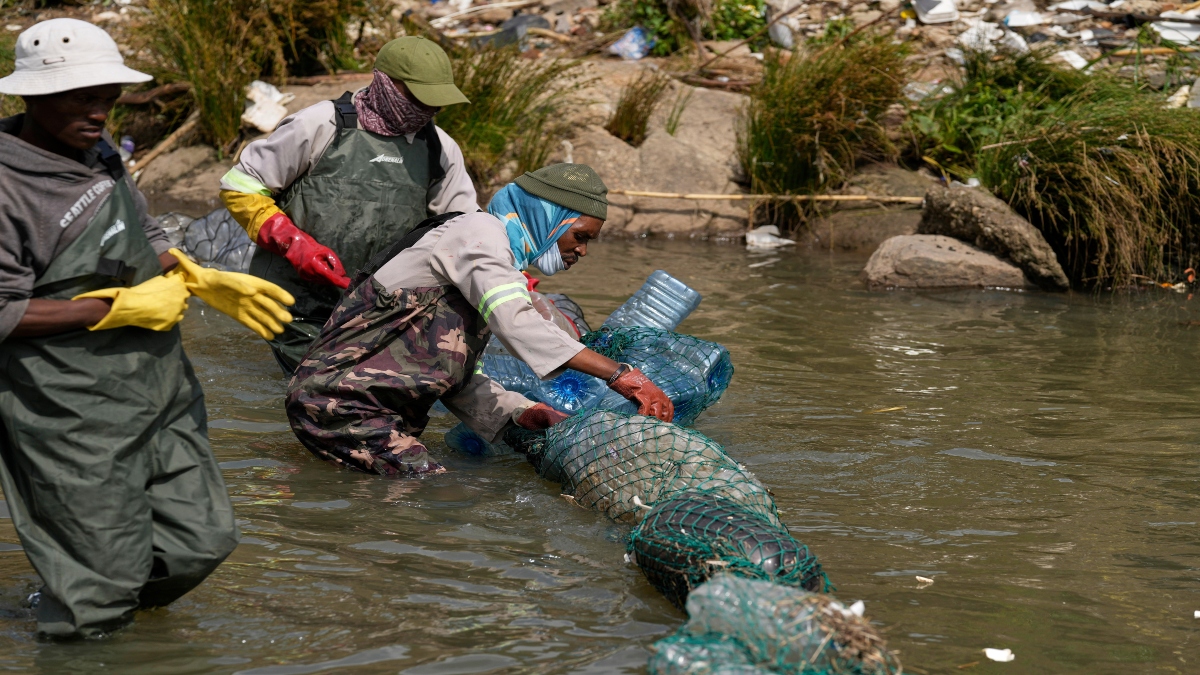As leaders from the Group of 20 prepare to gather in Johannesburg this weekend for the bloc’s first-ever summit on African soil, South Africa is putting its oldest township, Alexandra, at the symbolic center of the conversation.
The host nation wants the meeting to spotlight urgent challenges facing poorer countries — from climate-driven disasters to the slow pace of green development — while also navigating its own vulnerabilities.
Developed world should do more
In Alexandra, volunteers wade into the polluted Jukskei River in wetsuits, untangling garbage nets damaged by heavy rains. Without them, floods can tear through low-lying shacks, endangering the township’s half-million residents who live just steps from the wealthy financial hub of Sandton.
South Africa plans to use the summit to press rich nations and major financial institutions to increase support for countries hit hardest by climate change — a message echoed at global climate talks in Brazil.
Binaifer Nowrojee, president of the Open Society Foundations, told The Associated Press that countries are being forced into a “destructive choice” between economic growth and climate action, highlighting how inequality deepens climate vulnerability.
Changing climate hurting the poor most
The World Bank says the world’s poorest countries experienced nearly eight times more natural disasters from 2010 to 2020 compared with 1980 to 1990.
Southern Africa has endured a brutal decade — from powerful tropical storms like Cyclone Idai that caused $2 billion in damage, to last year’s El Niño-driven drought that crippled small-scale agriculture.
Quick Reads
View AllIn Alexandra, residents feel this acutely. Floods routinely cut off bridges, leaving children unable to reach school.
“It is a big hazard,” Associated Press quoted Semadi Manganye, co-founder of the Alexandra Water Warriors, the volunteer group leading local resilience efforts, as saying.
How to fund the fight against climate change
Climate finance remains one of the most contentious issues on the G20 agenda.
Wealthy countries agreed at last year’s UN climate summit to mobilise at least $300 billion annually by 2035 to help developing nations cope with climate impacts. Independent experts, however, say that figure needs to reach $1 trillion a year by 2030 to make a meaningful difference.
Yet the G20 may struggle to reach consensus: the United States — one of the world’s biggest emitters — will skip the summit, boycotting over President Donald Trump’s widely discredited claims that South Africa is persecuting its white minority.
The host is on slippery grounds
While South Africa is pushing global leaders to act, it is also grappling with its own shortcomings. The Alexandra Water Warriors and similar township projects highlight community resilience, but the broader picture is bleak.
An Amnesty International report released ahead of the summit says the government is failing roughly 5 million people living in informal settlements without adequate housing or climate-resilient infrastructure.
Recent floods in the Eastern Cape killed more than 100 people — a tragedy President Cyril Ramaphosa linked to climate change, though local officials pointed to broken infrastructure and unsafe housing as major factors.
What’s the future of green growth?
Despite the challenges, some see opportunity. Around 3,000 Alexandra residents now earn small stipends through environmental projects supported by a mix of public and private donors, up from just 250 participants when the initiative launched in 2022.
“When the 25th of every month comes around, you begin to smile,” AP quoted volunteer Ntombi Maponya as saying.
Economist Vera Songwe argues that embracing climate resilience could accelerate development rather than hinder it.
“The good news is that green, sustainable and resilient growth is much faster growth,” she said at an event ahead of the summit.
As the G20 convenes, Alexandra stands as both a warning and a blueprint — a place where climate vulnerability and community-driven solutions meet, and where the world’s richest and poorest nations will be asked to confront a shared future.
With inputs from agencies
)